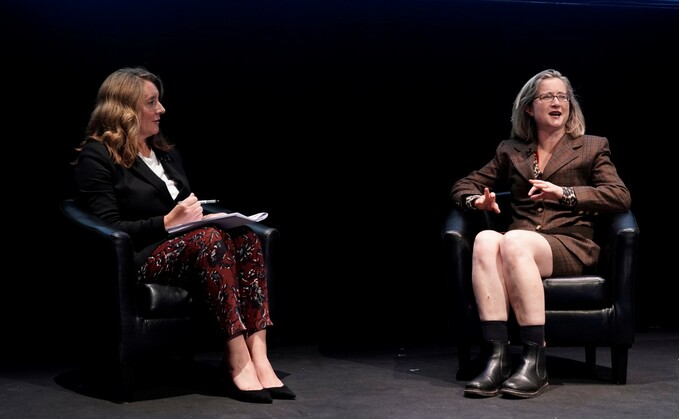
(L-R) Lucy Siegle and Futerra's Lucy Shea at the Net Zero Festival
Futerra CEO Lucy Shea puts greenwashing, climate action and behaviour change centre stage on day one of the Net Zero Festival
Companies should take far more care to measure the climate impact of their climate advertising, lobbying and advocacy - sometimes known as ‘Scope X' emissions - Futerra CEO Lucy Shea told the the Net Zero Festival audience today.
Boasting vast experience in helping brands and organisations to embark on genuinely beneficial climate action both before and at Futerra - the global sustainability strategy and creative agency founded in 2001 by entrepreneurs and marketing experts Solitaire Townsend and Ed Gillespie - Shea certainly has a strong grasp on the phenomenon of 'greenwashing'.
During a session during the Net Zero Festival that was specifically geared towards the issue of greenwashing and how companies can protect themselves from allegations of misleading the public on their environmental credentials, Shea said it was critical that companies went beyond working towards carbon targets but focused on "maximising their positive impact on consumers".
Fossil fuel advertising bans - a move taken by both the French government and several European cities in recent years - are all very well, but proactive messaging about behaviour change offer greater potential to drive change, Shea argued.
"It's really important to screen some of the bad, but actually what are we doing about promoting the good?" she asked.
The latest report from the Intergovernmental Panel on Climate Change (IPCC) saw the UN climate science body specifically call for more action to harness public behaviour change in to support the net zero transition, noting that five per cent of global emissions could be mitigated by changing habits.
Highlighting the IPCC's conclusions on this front, Shea urged companies to harness this approach in their marketing and advocacy work. "Stories told by individual organisations […] are crucially important in the fight towards a 1.5C future, in a just and equitable manner," she said. "What Scope X is about is recognising that brain print is as important as footprint."
Shea said it was "no wonder" the rapid increase in consumer desire for green products and services had led to an "explosion" of greenwashing. Much of the time, she argued, misleading claims were "mistaken rather than malicious" and the result of "enthusiastic marketing teams" and a media industry too resource-strapped to scrutinise corporate claims.
Yet regardless of the intensions behind misleading claims, Shea said greenwashing still exposed companies up to significant financial and reputation damage. "Good intentions are no protection against the risk," she said.
In the UK, both the Advertising Standards Authority and Consumer Markets Authority (CMA) have ramped up their activity against greenwashing over the last year, with the latter recently launching a probe into the green claims made by firms in the fashion industry.
Earlier this month, Futerra became the first firm to achieve accreditation as an official ‘climate solutions provider' from the UN-Backed Race to Zero campaign. "That's where all businesses need to be going," Shea said, arguing that companies need to focus their climate efforts on what consumers want.
"If you can figure out where in your value chain and consumers are struggling, help them, and point all of your marketing and communications budget around that that would solve the greenwash issue overnight," she said
Elsewhere during the discussion - which was hosted by presenter, journalist and author Lucy Siegel - Shea argued "green hush" was as much of an issue of "greenwash", highlighting research signalling that the overwhelming majority of Gen Z consumers born around the turn of the century were distrustful of all green claims.
Later, a separate discussion at the Net Zero Festival also touched on greenwashing and the role of television advertising in helping to drive climate action.
Carys Taylor, the director of film and television sustainability organisation Albert, hymned the need to fold different types of climate narratives on screen, and reach audiences.
"You need to get into sport and all different genres, and make it relevant to those audiences," she said. "Perhaps [they don't] even mention climate change - [for instance] I'd love to see two or three lines coming out in soaps, perhaps about a gas boiler engineer having to retrain."
Similarly, BBC TV lead for sustainability Gaby Hornsby espoused the need to reflect everyday climate action in drama. "[We need to move] from issue-based storytelling to action-based storytelling," she said. "So showing real people engage in real activities."









